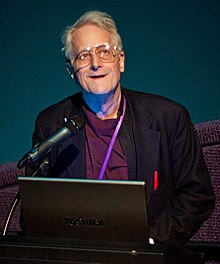泰德·尼尔森(Theodor Holm Nelson,1937年6月17日—)是美国信息技术先驱,哲学家和社会学家。他于1963年创造了术语超文本与超媒体[1],于1965年发表[2]。他创造的术语还包括超引用、虚质性、内联性与远程性爱。
根据1997年《福布斯》的个人资料,尼尔森将自己视为文学浪漫派,像是西哈诺·德·贝杰拉克或“软件领域的奥森·威尔士”。[3]
生平
著作
- Life, Love, College, etc. (1959)
- Computer Lib: You can and must understand computers now / Dream Machines: New freedoms through computer screens—a minority report (1974), Microsoft Press, revised edition 1987: ISBN 0-914845-49-7[6]
- The Home Computer Revolution (1977)
- Literary Machines: The report on, and of, Project Xanadu concerning word processing, electronic publishing, hypertext, thinkertoys, tomorrow's intellectual revolution, and certain other topics including knowledge, education and freedom (1981), Mindful Press, Sausalito, California; publication dates as listed in the 93.1 (1993) edition: 1980–84, 1987, 1990–93
- The Future of Information (1997)
- A Cosmology for a Different Computer Universe: Data Model, Mechanisms, Virtual Machine and Visualization Infrastructure. Journal of Digital Information, Volume 5 Issue 1. Article No. 298, July 16, 2004
- Geeks Bearing Gifts: How The Computer World Got This Way (2008; Chapter summaries)
- POSSIPLEX (页面存档备份,存于互联网档案馆): Movies, Intellect, Creative Control, My Computer Life and the Fight for Civilization (2010), autobiography[7][8]
文献
参考
Wikiwand in your browser!
Seamless Wikipedia browsing. On steroids.
Every time you click a link to Wikipedia, Wiktionary or Wikiquote in your browser's search results, it will show the modern Wikiwand interface.
Wikiwand extension is a five stars, simple, with minimum permission required to keep your browsing private, safe and transparent.

